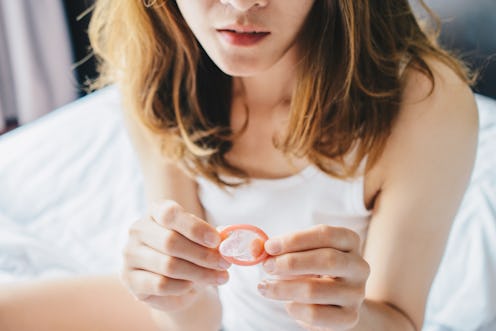Life
What To Ask Yourself Before You Stop Using Condoms, According To A Sex Educator

In this week's Sex IDK column, Emma McGowan, certified sex educator and writer, answers your questions about using condoms in a long-term relationship.
Q: How important is condom use with a long-term partner if you’re on other forms of birth control?
Many people assume that as soon as you’ve decided to be with someone “for real” — whatever that means to you — then it’s OK to throw away the condoms. But I love this question because it shows that people do think about protection, even once they’ve given each other a promise to be "faithful," whatever that looks like for you. And that’s just good practice, for your own health and for the health of your partner.
First, let’s talk about what “long term” means. Are we talking a year? Six months? A decade? Your answer to that matters, for two reasons. You seem to be primarily concerned about condoms for birth control, but condoms protect against sexually transmitted infections, too. It’s best practice to get tested with your partner before deciding not to use condoms anymore, in order to detect and treat any STIs that either of you could be carrying (that you may have gotten before you started your relationship). And remember: Not having symptoms doesn’t mean you don’t have an STI. Many of the most common STIs have either minor or no symptoms, so the only way to know for sure is to get tested.
Also, HIV won’t show up on a test for between four and six months for most people (and up to three months for others), according to Planned Parenthood. So if you’re doing your due diligence and getting tested before ditching the condoms, that timing is something to take in consideration.
The other reason the length of your relationship matters is because while some people might trust their significant other completely from day one, it’s more common to take time and experience to build up a trusting relationship. Are you there yet with your partner? Do you trust them to stick to any agreements you’ve worked out about outside sexual contact, whether those agreements are “no sex with other people” or “only sex with other people if you’re using protection"? Those are questions worth thinking long and hard about before you decide whether or not to continue using condoms or other barrier methods.
Which bring us to the monogamy question. For many people “long term” implies monogamy, but that’s not the case for everyone. If your long term relationship is any degree of open — from a “monogamish” situation to polyamory to cheating — then it might be a good idea to keep condoms in play in your primary relationship in order to prevent getting or transmitting STIs.
And, finally, how much do you not want to get pregnant — and what, exactly, is your other form of birth control? Different forms of birth control have different rates of effectiveness. If you have an IUD, for example, then there’s really no reason to use condoms unless you’re concerned about STIs. IUDs are the most effective form of birth control, with fewer than 1% of people who use them getting pregnant every year. On the other hand, methods like the Pill, the patch, and the ring are less effective than an IUD — although still very effective! That's because those forms of birth control rely on people to do certain things (like take a pill every day at the same time) in order for them to work perfectly. Since no one is perfect, those forms of birth control are less effective with typical use. But if getting pregnant would be the worst thing that could happen to you, then it might be a good idea to use condoms as a backup.
So, to sum it up, condom use in a long-term relationship is as important as you think is important. Assess your needs and desires — as well as those of your partner — and take it from there. After all, the best choice about sexual health is an educated one.
Read more from Bustle's 'Sex IDK' column:
- What A Sex Educator Needs You To Know About Genital Warts
- Before You Ask How To Prevent Spreading Herpes, Ask What You’re *Really* Preventing
- What A Sex Educator Needs You To Know About Going Down On Someone With HPV